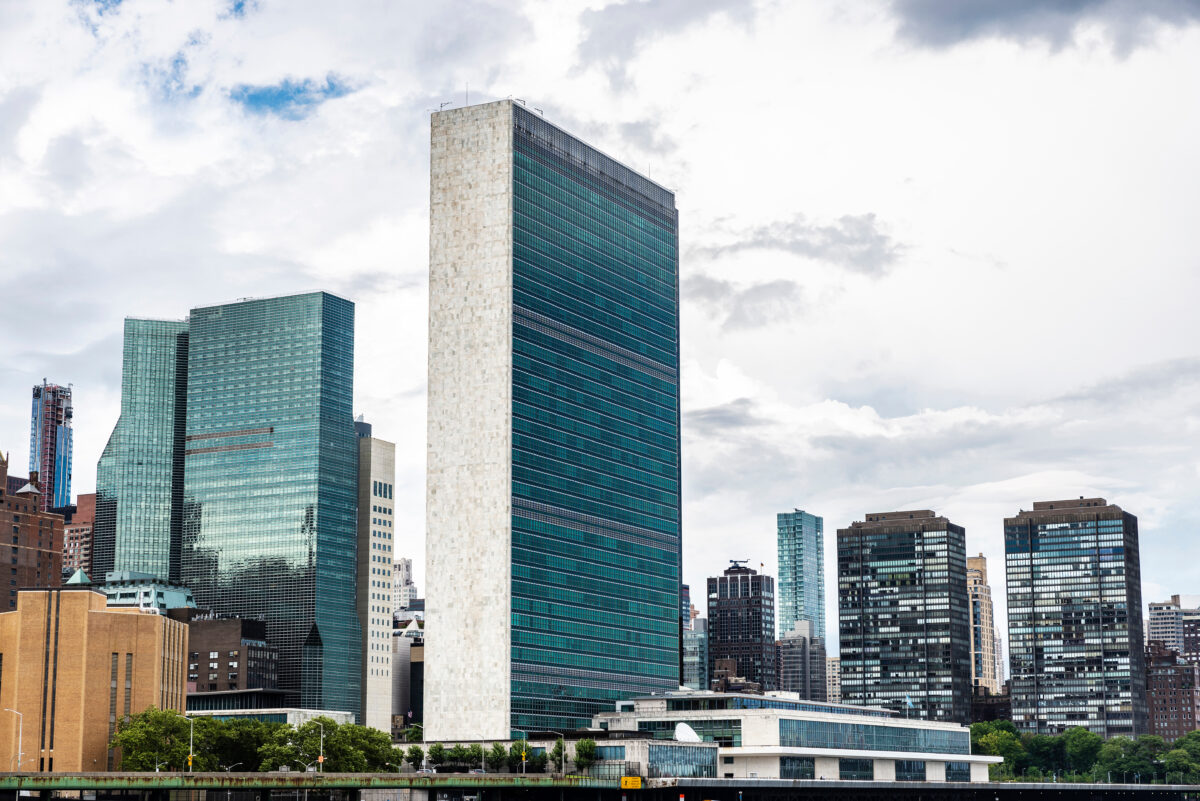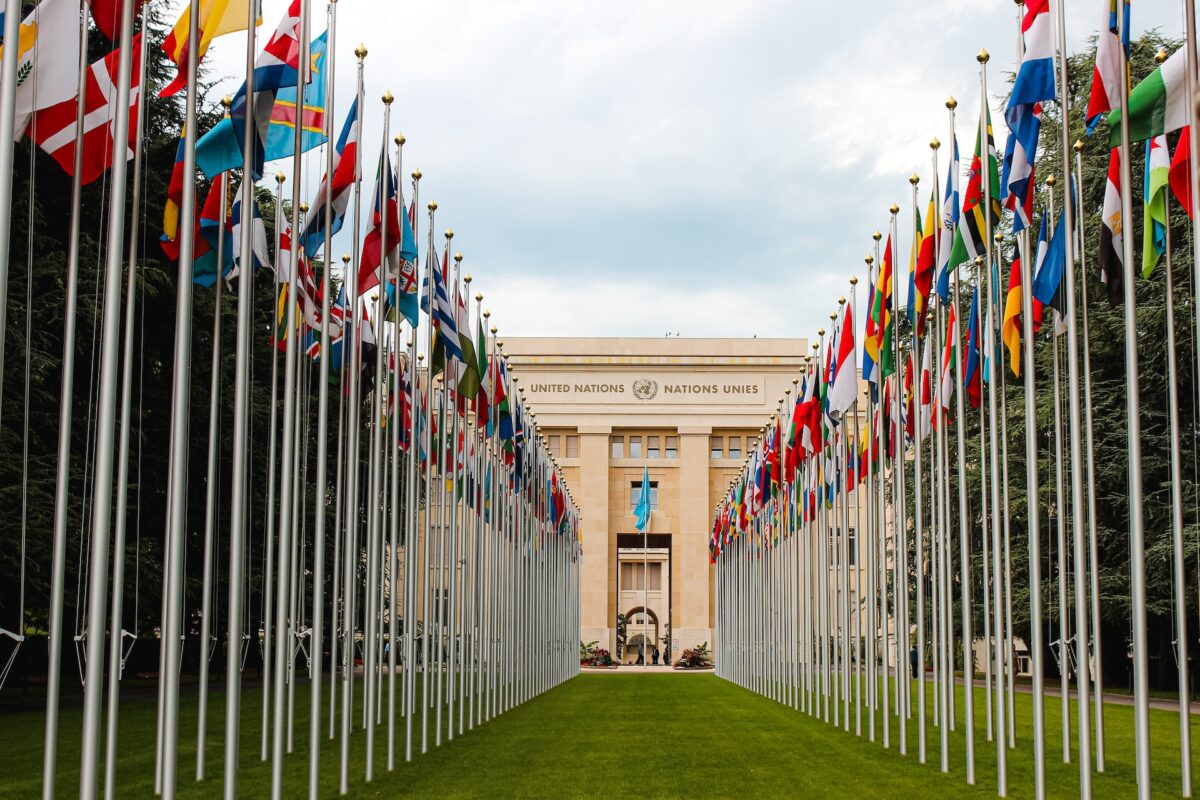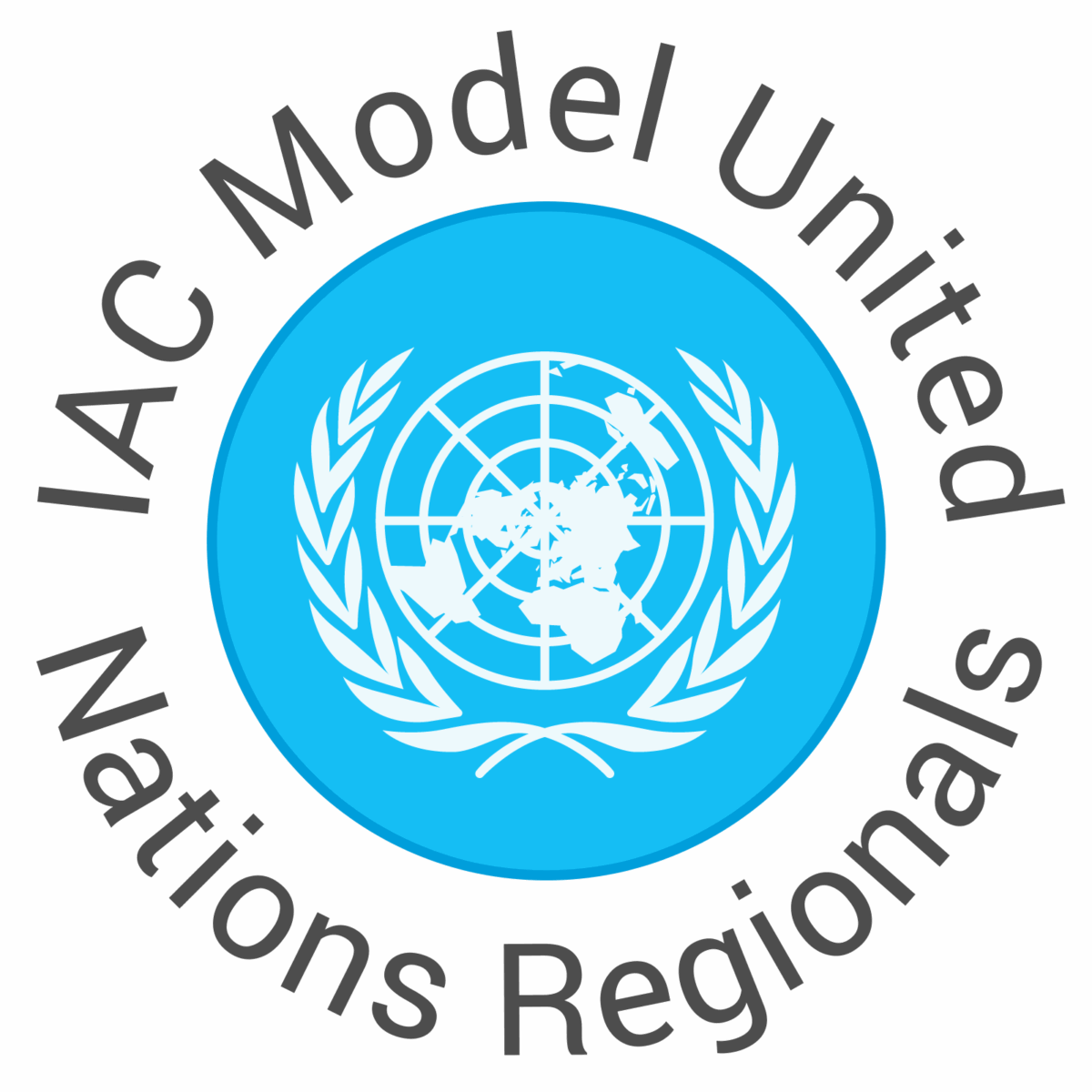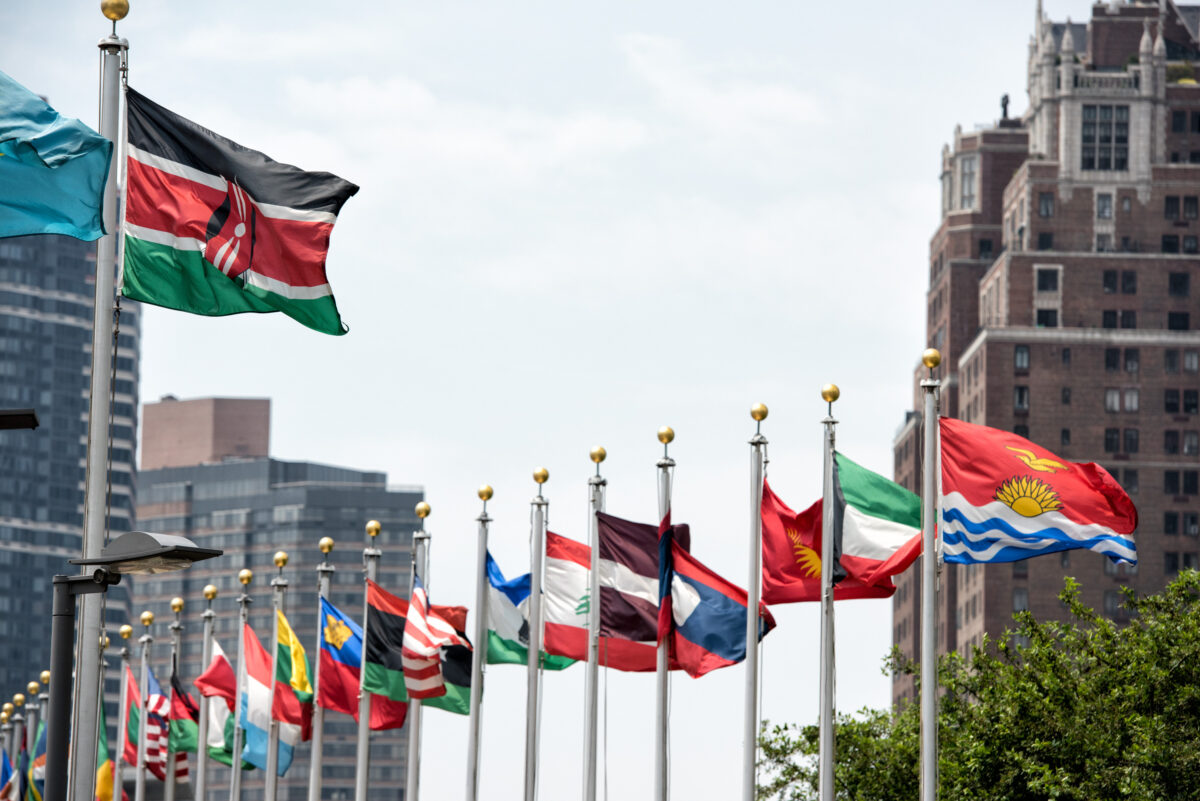Model United Nations
Regional Conferences
Middle & Elementary School Divisions Homepage
New for the 2025-26 Academic Year!


Model UN Regional Conferences Overview

Beginning with the 2025-26 competition season, International Academic Competitions is pleased to announce that it will be conducting a series of Model UN Regional Conferences across the USA for students in grades 4-8! These will be held from January-April at approximately 6-10 sites. In future academic years, we anticipate the number of regional conferences will grow substantially. Please explore this page to read about the structure and format of our Model UN Regional Conferences. If you are potentially interested in holding a conference at your school, please contact our Model UN Program Coordinator, Ms. Audra Dankwardt, at ModelUN@iacompetitions.com
Jump To:

Competition Format
Model United Nations is a simulation of the United Nations or other international bodies where students represent a country or play the role of a decision maker in a committee. IAC is organizing Regional Conferences throughout the USA from January-April. Registration for all scheduled conferences will open in October 2025.
At each Regional Conference, a Standard Committee and a Crisis Committee will be held with the Standard Committee taking place in the morning and the Crisis Committee taking place in the afternoon.
1
Standard Committee
All students will begin the day by taking part in the Standard Committee. This committee will be structured as an Administrative and Budgetary Committee of the UN General Assembly which is tasked with the topic of exploring ways of Reforming the United Nations Security Council. This topic is well-placed to allow students to not only learn about the United Nations itself, but also to provide an introduction to geopolitics. Why would certain countries prefer the Security Council to be structured in a certain way? Why might the UN Security Council be in need of reform? Which countries benefit from the status quo, and which countries would likely prefer to see changes? Please consult the Background Guide to help prepare.
Students will debate this topic using basic parliamentary procedure and then aim to craft and draft resolutions. We will provide instructional materials to students in advance of each conference regarding how exactly these elements of the committee will work. Please also see the Preparation Resources and the Background Guide linked below on this page.
Committees will be limited to no more than 30 delegates; countries will be assigned randomly. Registration will close approximately 3 weeks prior to each conference, and on the day following the close of registration, country assignments, which will be assigned by our staff, will be sent out. The Standard Committee will last for 3.5 hours. The last 15 minutes of this will be given over to voting procedure on resolutions, though in certain cases, committee chairs may entertain an earlier voting session. If a resolution is then passed, debate may shift towards dealing with the consequences of the adopted resolution.
Awards will be given out for performance for each committee room separately (e.g. if there are two 8th grade rooms, separate awards will be given out for each room). Additionally, awards at all Regional Conferences will be given out for both the Standard Committee and the Crisis Committee separately. Each conference thus presents two sets of awards (and thus two chances to qualify for the National Championships). There will not be an overall conference champion or set of rankings. Approximately the top 40% of delegates in each committee room will win awards. The top delegate will win the Best Delegate award (which, per Model UN tradition takes the form of a gavel). Other delegates win awards for Outstanding Delegate (up to two of these), Distinguished Delegate (up to 4 of these) and Honorable Mention (up to 5 of these).
Note that while awards will be given out within the committee room as a whole, if there are students in younger grades competing together with older students, then approximately 40% of students in each younger grade will likewise receive at least a grade-level commendation (which is also an official award that can qualify students for the National Championships). For example, if in a combined committee of 10 8th graders and 10 7th graders, there are 8 overall awards, but only 2 of these go to the 7th graders, then the 3rd and 4th best 7th graders will also receive grade-level commendations.
2
Crisis Committee
The second portion of the Model UN Regional Conference takes the form of a “Crisis Committee.” Crisis committees function differently from Standard Committees and are an integral part of Model United Nations. In a crisis committee, a hypothetical scenario (often taking current world events as a starting point, including at our Regional Conferences) is postulated. Students (who are given a new country assignment) then need to react and collaboratively problem solve. Depending on their decisions, conference staff will then provide updates, and then students need to deliberate and make further decisions. Crisis committees are dynamic, entertaining (look out for appearances by conference staff in costume!), and lots of fun for competing students. At the Regional Conference, the time allotted for the Crisis Committee is 2 hours.
Typically, no advance information is provided in advance to students (the emphasis is on collaboration in committee, not prior knowledge or preparation). However, we will note that at our Regional Conferences for the 2025-26 competition year, the crisis will have a geostrategic dimension with the potential for great power military conflict. So be forewarned, delegates, the fate of the world is in your hands!
Bonus
Stage 1
Lunchtime Qualifying Exams & Buzzer Quiz Demonstration
During the middle part of the lunch break, conference staff will administer the In-Person Qualifying Exams (IRQEs) for the National History Bee, National Geography Bee, and/or National Science Bee. These three Bees are subject-specific quiz competitions that thousands of students take part in each school year. At the Regional Tournaments and National Championships for the Bees, students are read paragraph-length questions out loud, with clues on each topic presented in descending order of difficulty. Students ring in with the buzzer system when they know the answer. These competitions are lots of fun as well, and promote critical thinking skills and long-term memory knowledge of science, history, and geography topics as students grapple with the clues in the questions. Here is a sample question in this format:
With his cousin Timothy Folger, this man charted and named the Gulf Stream. This man founded America’s first public library and contributed significantly to the pro-Revolutionary paper The Pennsylvania Enquirer. For the point, name this Founding Father and polymath known for founding Philadelphia’s first fire department who also conducted basic experiments in electricity.
ANSWER: Benjamin Franklin
The In-Person Qualifying Exams are free of charge and consist of 30 multiple choice questions per subject. Students who score 15 questions correct or higher then qualify for the Regional Tournaments of these competitions, over 150 of which will be held in-person and online during the 2025-26 academic year. In order to qualify for these three competitions at the National Championships, it is necessary to compete first and qualify at the Regional Tournament level.
Students may also elect to take any of the National Qualifying Exams (NQEs). These cost $20 each, have 35 questions (with each correct answer worth 2 points; a perfect score is 70), and are offered as the qualifying stage for six separate competitions. Each of these is held at the IAC Middle and Elementary School National Championships using the same buzzer-based format:
- 1
- 2
National Citizenship Bee (government, current events, economics, US History, etc.)
- 3
National Humanities Bee (literature, fine arts, religion, mythology, etc.)
- 4
- 5
US History Bee (entirely American history, in contrast to the National History Bee)
- 6
US Geography Bee (entirely American geography, in contrast to the National Geography Bee)
On the NQEs, students who score 50 or higher, or above the National Median Scores on these exams (if that is lower than 50) for their respective age division qualify for the National Championships of these. The National Championships of all 6 of these competitions feature a buzzer-based quiz tournament format. Students who qualify for these events at the National Championships can participate in both them and the Model UN National Championships. Students may sign up for up to 4 exams at lunchtime; these can be any combination of IRQE and NQE exams.
During the latter part of the lunch break, conference staff will also demonstrate how buzzer-based quiz tournaments work with a demonstration for students. A sample of history, geography, and science-themed questions will be played. This will help familiarize students with the format used both at Regional Tournaments of the National History, Geography, and Science Bees, as well as the format used at the National Championships of the six competitions for which the National Qualifying Exams are offered.
Bonus
Stage 2
International Geography Championships

View to the Beach, JW Marriott Resort & Spa, Khao Lak, Thailand
Students who win an award at the 2025-26 Regional Model UN Conferences above the Honorable Mention level also qualify for the 2026 International Geography Championships which will be held at the JW Marriott Resort & Spa on the beach in Khao Lak, Thailand from July 5-12, 2026!
The International Geography Championships is a week-long event with numerous competitions (including Model UN committees), field trips, family activities, and more. In each event, medals are awarded to the top 3 competing students in each age division. US students compete for their state; students from other countries (or students in the USA who were born abroad or who have foreign citizenship) represent those countries. Two of the most prestigious events at IGC are the International Geography Bee World Championships and the International Geography Bowl World Championships. An overall IGC Championship title is also awarded in each age division; please view the website at www.geochampionships.com for further details on all events and to register. We hope that you will be able to join us at IGC 2026!
For all questions on the 2026 International Geography Championships, please email igc@iacompetitions.com.
Host a Conference
International Academic Competitions is actively seeking host schools for Regional Model UN Conferences!
If you are interested in bringing a Regional Model UN Conference to your school, we would be happy to work with you to make this work. For a conference that is open to students from other schools, we require access to a minimum of six classrooms (though it is possible that fewer will be needed) on a Saturday, Sunday or holiday between January 24 and April 19. Please see our standard conference schedule here. This can be adjusted up to 30 minutes earlier or later depending on your preference.
Each host school must commit to having a minimum of 15 students take part; this is both to ensure a critical mass of students for a worthwhile conference, and also to ensure that costs will be covered (particularly for travel for IAC-provided Conference Staff). Host school contacts are paid a stipend ranging from $200-$500 depending on the size of the conference; $200 for 15-25 students; $300 for 26-50 or fewer students; $400 for 51-100 students; $500 for 100 or more students.
If you are interested in finding out more about hosting, please contact our Model UN Coordinator, Ms. Audra Dankwardt at ModelUN@iacompetitions.com
Preparation Resources
Rules & FAQs
Results
Conference results will be posted here beginning in January 2026.
